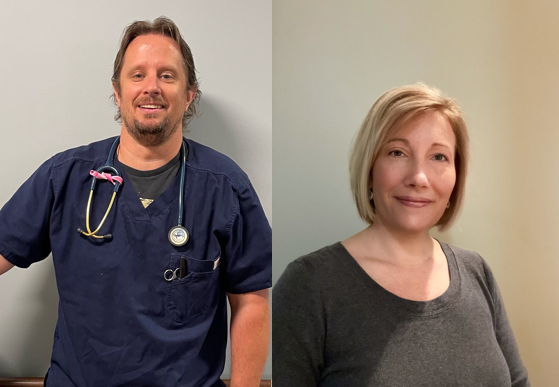Commitment + Clinical Leadership = Better Outcomes

What is a Respiratory Therapist?
Respiratory therapy is a field of study that focuses on the lungs and breathing. Respiratory therapists help our residents at Saber Healthcare with their breathing problems and guide them in reaching their wellness goals.
Brian Reynolds, Assistant Director of Respiratory at Waterside Health and Rehab, and Holly Nolan, a Respiratory Therapist from Centerburg Respiratory, took time to share their knowledge about respiratory therapy and how they work with our residents each day.
“At its core, our field is about taking care of people. We focus on the lungs and respiratory system from a cardiopulmonary perspective,” Reynolds said.
“It’s not one specific idea when it comes to caring for residents in long-term care. We work each day with them, and we can see the changes over time. Our team takes a personalized approach where we monitor them and see how we can help them be successful,” Nolan said.
How did you get started in this career?
“I was in the navy and explored different ideas because I wanted to specialize in medicine. At the time I wasn’t exactly sure about it, but I studied it and it was interested to me. Now I’ve been in the field for about ten years,” Reynolds said.
“I started my journey as a unit clerk in a hospital when I was in high school. I talked to the respiratory team, and they encouraged me to pursue the field. As I looked into it, I found the cardio-pulmonary system fascinating and I was always soaking up all of the interesting elements,” Nolan said.
What does a day in your job look like?
Respiratory therapists have many responsibilities, from doing regular check-ups on their residents to assisting with necessary treatments. Nolan and Reynolds shared what a typical day in the field looks like for them.
“To be a respiratory therapist, it’s a lot of time management because we deal with patient care, administration, and employees. A manager should be organized because they need to be able to complete all of the paperwork while still putting the resident first,” Reynolds said.
“We work 12 hour shifts. Our day has some normal routine tasks based on doctor’s orders for medications and ventilation management. We also spend time checking up on the residents and encouraging them to progress. We want to help them become more independent and get home if that’s the ultimate goal,” Nolan said.
What are the requirements to become a RT?
“In the navy, respiratory therapists took eight months of school. The classes were 5 days a week and lasted for 8 hours a day. For people not in the military, they will typically obtain an associate’s degree, bachelor’s, and a master’s,” Reynolds said.
“The minimum requires is to have an Associate’s degree in Respiratory Therapy. Many places require a Bachelor’s though, more than ever before. After you complete the Bachelor’s or Associate’s, there is a certification earned. There is also a registry exam that allows someone to become a registered respiratory therapist, which is a step some therapists choose to take after becoming certified,” Nolan explained.
What is your favorite part about your job?
“The satisfaction of taking care of people, and making a difference in people’s lives,” Reynolds told us.
“Whenever I get to put a speaking valve on someone and they get to hear their voice and speak to their family for the first time in a while. Every time it happens, it reminds me why I do what I do,” Nolan said.
What is something most people do not know about Respiratory Therapy?
“Most people don’t see the humanistic side, the relationships that we build, and how we genuinely take care of people that need help,” Reynolds said.
“Respiratory therapists take many classes and have a background in different areas such as physics and pharmacology. There are many skills that respiratory therapists build, from pulmonary functioning to intubation in surgery to helping people in emergency situations,” Nolan said.
Any Advice for Aspiring Respiratory Therapists?
“I’d recommend getting some exposure to see if you can come onboard and see what they do. That way, you can make an educated decision. I’d recommend for any career,” Reynolds said.
“It’s going to be overwhelming, but that’s okay and you should take it day-by-day. It’ll be worth it. The difference you make in people’s lives on a daily basis and the comfort you can give them to breathe easier is rewarding,” Nolan said.
Any healthcare advice?
“Don’t forget to make yourself a priority,” Reynolds said.
“With any healthcare suggestion, do your own research to get the whole picture. Always look at the pros and cons so that way you can make an educated decision with what you feel is best for your person,” Nolan said.
Saber Healthcare Thanks Our Respiratory Therapists!
This week, Saber Healthcare thanks our respiratory therapists for helping our residents with their lung conditions. From asthma to pulmonary diseases, our respiratory team is there every step of the way to help our residents reach their goals.
To learn more about Saber Healthcare and the care that we offer, click here.
Saber Healthcare is an organization dedicated to providing consultant services to long term care providers. This article is for informational purposes and is not meant to be seen as professional advice. Please consult with a medical expert before relying on the information provided.
